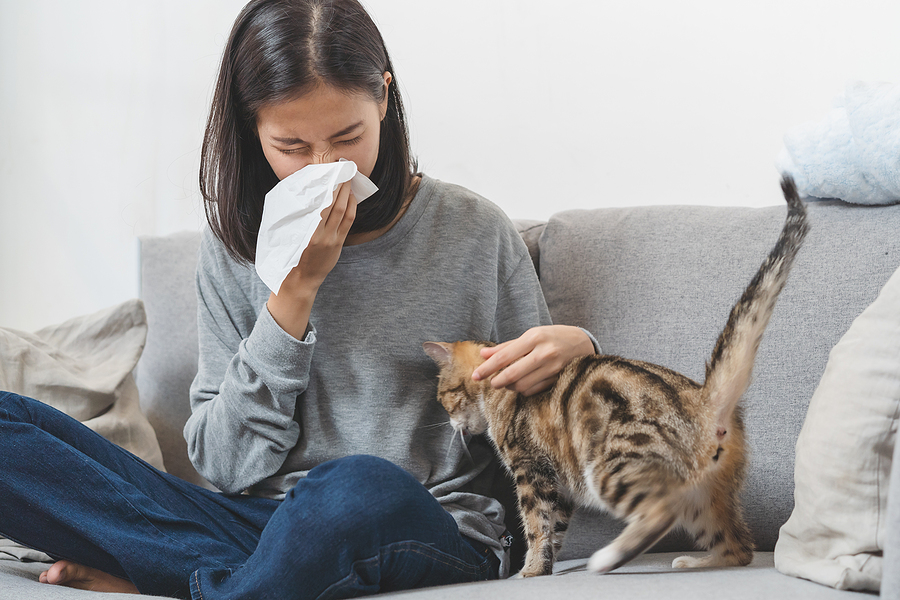Is It Just Dry Winter Skin or an Allergic Reaction?
Posted By:SSG Admin Posted On:17-Feb-2025
So many things cause dry skin. Winter indoor environments are harsh on the skin because heating systems lead to less humid air. It may not just be winter dry skin, however. Premium Allergy knows that spring and winter are the two most prevalent times for atopic dermatitis to occur. How do you know when it’s an allergic skin reaction and not just the dry winter air?
How Can You Tell If It’s Allergies?
How do you tell the difference between winter’s dry skin and allergic reactions? Pay attention to your symptoms.
Dry Winter Skin
Winter’s dry skin is more likely to affect the hands, arms, legs, and feet. It can happen on the trunk, but it’s less common. Signs include dry, itchy skin. It might be red and flaky.
It occurs when water leaves the upper layers of the skin. This can be due to the heat furnaces and boilers generate all day and night to keep a home or business warm. It can be winter dehydration or exposure to cold, dry air outside.
Because the skin is missing out on water, it dries and cracks. These cracks make it easier for irritants and germs to get into the skin, which can lead to infections and make it easier for allergies to irritate the skin.
Skin Allergies
A lot of things can trigger skin allergies, including ingredients in skin care products and cleaning products. Some people experience skin allergies when eating certain foods, such as wheat. Exposure to certain plants (think nettles or poison ivy) or items like latex, metals, or pet dander can also trigger atopic dermatitis, which is the medical term for skin allergies.
Skin rashes can present themselves as eczema or hives. You might also find your skin becomes red and itchy, forms blisters, or develops a bumpy rash that itches or burns.
Some people find their skin develops a bumpy rash, but it’s also very red and can be itchy or burn. This is often a chronic skin condition known as rosacea. It’s still undetermined exactly what causes it, and there’s no cure. Some treatments help ease the redness and discomfort. Because it’s similar to skin allergies, you need to talk to a doctor about your skin and get a professional diagnosis.
Tips for Managing Winter Dry Skin and Allergies
If you’re dealing with winter dry skin, moisturizer is your best line of defense. Choose a hypoallergenic, unscented moisturizer if your skin is sensitive to fragrance and harsh chemicals.
Shower in warm, not hot water. Hot water may feel great on a cold morning, but it dries your skin because it strips off more natural oils. A warm shower doesn’t do as much damage, so your skin doesn’t dry out.
Keep your showers to no more than 10 minutes. When you’re done, put moisturizer on your skin while it’s still damp. Ideally, you want to get moisturizer on within a few minutes. You trap moisture in the layers of skin by covering the skin with a moisturizer. Aim for one with hyaluronic acid or ceramides that offer a protective barrier. Before going to bed, moisturize again.
When you shower, use a gentle soap that contains as few chemical ingredients as possible. A soap designed for sensitive skin is good. Avoid soaps and body wash products that contain alcohol or peroxide products, salicylic acid, and strong perfumes. Soaps with coconut oil, ceramides, and hyaluronic acid are ideal. Use soap only in areas that need it, such as your armpits.
Aim for an indoor humidity level of 40% to 60%. If you go over 60%, you increase the risk of mold and mildew within the home. If it’s too low, static electricity and dry skin are more likely. A humidifier helps add humidity, but make sure you first read the pros and cons of humidifiers.
You can naturally add humidity to your home by showering with the bathroom door open to let the steam enter the rest of the home. Boiling a pot of water on a woodstove or stove top also helps, and you can add items like cinnamon sticks or lemon peel and make your home smell nice at the same time.
Make sure you’re hydrating properly. When it’s cooler, your thirst decreases. While you might not feel thirsty, you still need as much water as you’d drink in the spring and summer. With heating systems drying out your skin, replacing the water is essential. Women should aim for 2.7 liters per day, while men need about 3.7 liters.
Some of those tips also help with skin allergies. Humidifiers may make skin allergies worse, especially if mold is an allergen that triggers an allergic response. If you use a humidifier, make sure you’re cleaning it regularly to avoid mold and mildew growth.
Use skin care products that avoid harsh chemicals and strong fragrances. They often worsen allergic skin conditions. Choose products that are hypoallergenic and approved by dermatologists and allergy specialists.
Before you can treat skin allergies, you need to fully understand what causes them. Sometimes, you need to avoid using specific products or eating certain foods. Skin care products that are for sensitive skin may help. You might need prescription creams or other treatments available from an allergy doctor.
Get Help with Atopic Dermatitis
If you have atopic dermatitis, consult with a doctor. While treatments are available, it’s important to diagnose your exact allergies. You might not realize everything you’re allergic to, and missing just one allergen can make it hard to find the best treatment for skin allergies.
Sometimes, you have to do some research to determine your allergens. If you switch laundry detergents and suddenly experience rashes or hives, it’s likely an allergy to something in the new detergent. Look over the ingredient list to see if you see an ingredient that’s not in your usual product. If so, that’s probably the allergen.
Premium Allergy offers blood, patch, and skin tests to uncover your allergens. Once our allergy doctor knows what’s going on, you’ll find there are excellent treatments available, including specific skin care products, prescription creams, or biologics. Avoidance of your allergens is important, but there may be other treatment options that ensure you no longer have dry, itchy skin making you miserable in the winter.




